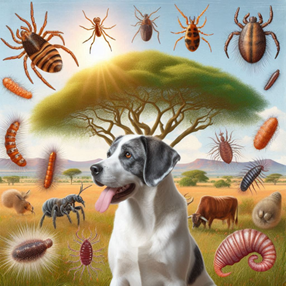
Parasites
Share
Winter was quick this year – or so it seems. Not as cold as we thought it would be, and for not as long. While there will probably be another cold snap or two, everybody, and I mean everybody, will soon be waking up to a new season – including the ticks, fleas, intestinal parasites, and everything that flies.
This is a critical time to ensure that your animals remain happy and healthy – so let’s figure out what the most common threats are and what you can do about them.
External parasites
These are all the small things that can crawl around on your pet’s skin – think ticks, fleas, mites, and lice. They can cause a whole range of diseases, some of which are life-threatening, so management is crucial to maintain your pets’ health.
Tick-related diseases occur when an infected tick bites your animal and “injects” a parasite into its blood. These diseases can, amongst others, affect your cat, dog, horse or other animal with potentially lethal effects.
If you are in an area where there are a lot of fleas, your pet could develop an itchy flea-bite allergy, in addition to more serious diseases. Mites and lice can cause hair loss, with or without itching. The easiest way to spare your animal the discomfort is to use an ectoparasiticide. For small animals (cats and dogs), you can consider products that are placed as a collar around the animal’s neck, or products that you apply to the skin, or products that come in tablet form. For horses and other large animals, you may want to use a spray or dip.
In making your decision, you should consider the budget – especially if you have a large pack of animals! Some of the longer lasting products may seem expensive but could compare well on a per-month basis. Something else that you may want to consider is the mechanism of action. This simply means how the product works. For example, some products kill ticks after they have bitten the animal, while others prevent them from biting. Also remember that products are made to match the weight of your animal – it could be packaged for small, medium or large dogs – so check your animal’s weight before choosing.
Carefully read the package insert to ensure that you do not over- or underdose. If you overdose, you could harm your animal. But underdosing is as bad since parasites could develop resistance, which means that products become ineffective over time. Take a look at the tick and fly control options that we offer for horses or livestock.
Internal parasites
Here we are mostly thinking worms. When your puppy or kitten is vaccinated, it is usually also dewormed. But don’t forget that adult dogs and cats also need deworming, at least twice per year. Small animal dewormers cover the important internal parasites, and you have a number of products to choose from for dogs and cats. Speak to your veterinarian if you are unsure of what to use. If you have a puppy or kitten, remember those all-important first visits to the vet, so that he or she starts life off on the best possible paw. Keep in mind that parvovirus (katgriep) is a real threat to your pup’s life, and that the occurrence is higher in spring and early summer – so do not miss out on those early vaccinations.
For horses, discuss a deworming schedule with your vet if you have not done so already. Consider these products to keep your equine in top form. And remember to schedule the African Horse Sickness vaccinations if you are in an endemic area – the vaccination season is between 1 June and 31 October.